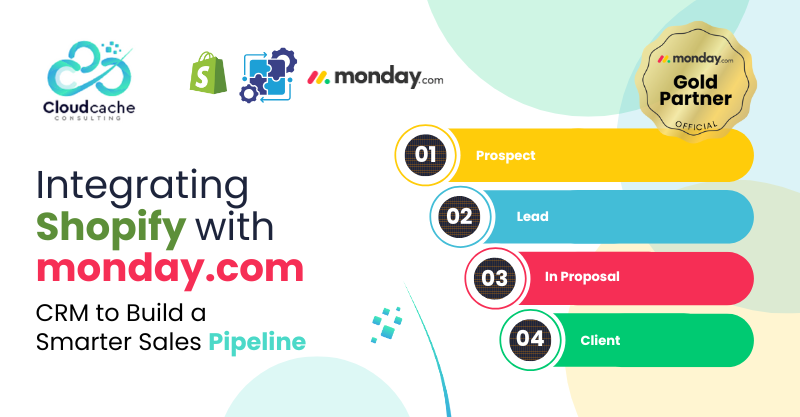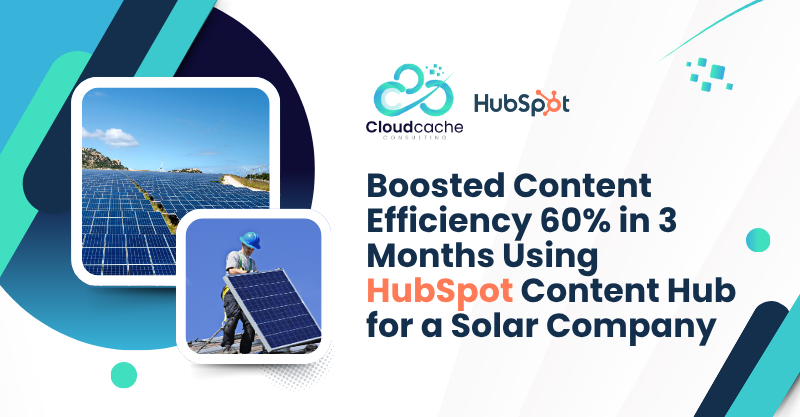
Integrating Shopify with monday.com CRM to Build a Smarter Sales Pipeline
An Australian-based equipment supplier client was struggling in managing scattered sales data with Shopify. CloudCache Consulting delivered Shopify and monday.com CRM integration solutions, automating order syncs, creating a structured sales pipeline, and building real-time dashboards for visibility and forecasting.
Shopify and monday.com CRM integration
About The Company
Our client is an industrial equipment supplier company. They were Brisbane Australian based and were operating in eCommerce Model.
Customer Challenges
The client’s growth was being slowed by a few common issues that we identified early in our discovery phase, such as:
- Data scattered across platforms: Shopify stored orders, while lead qualifications and follow-ups were done elsewhere, leading to confusion and data mismatches.
- No defined sales funnel: There was no structured process to track where each opportunity stood — from inquiry to closure.
- Manual data entry: Sales reps spent unnecessary time copying customer information and order details between systems.
- Slow coordination: Operations and sales teams weren’t aligned, which often led to delays in fulfilling orders or following up with customers.
Solutions
We designed and deployed a Shopify–monday.com integration that created a live connection between the client’s eCommerce platform and CRM. The goal was to make data flow automatically, reduce manual work, and build real-time dashboards that reflected actual business performance.
Understanding the Sales Journey
We started by sitting down with the client’s sales and operations teams to map their end-to-end process — from an order being placed on Shopify to the product being delivered and invoiced. We identified key touchpoints, pain areas, and what each team needs to work on daily. This collaborative mapping helped us design a structure that reflected how the business actually worked, not just how software typically does.
Setting Up the Integration
Using monday.com’s Shopify integration app and custom API configurations, we established two-way synchronization between the platforms. Key automations included:
- Every new Shopify order automatically created an item on monday.com, tagged with the customer’s details, purchase value, and order ID.
- Any change in Shopify — such as payment confirmation or delivery update — instantly reflected on monday.com.
- When an order was marked “Closed-Won” on monday.com, a connected task was triggered for the operations team to manage fulfillment.
Real-time syncing of payment and fulfillment status, so both teams worked with the same data.
Building the Sales Pipeline and Automations
We customized a sales pipeline board to reflect the client’s hybrid model — a mix of eCommerce orders and B2B deals. Stages like New Order, Qualification, Proposal Sent, Negotiation, and Closed-Won were defined clearly.
Automations were then layered in to reduce manual follow-ups:
- When an order stayed inactive for a certain number of days, monday.com automatically nudged the assigned rep.
- If a deal moved to the “Won” stage, it triggered a notification to the logistics team via Slack.
- Managers received weekly summary reports with pending deals, expected revenue, and conversion ratios.
Analytics and Dashboards
The dashboards displayed:
- Sales by Product Category and Channel (Shopify vs. Direct)
- Monthly Revenue Forecasts based on active deals and weighted pipeline formulas
- Average Order Value and Repeat Customer Rate
- Team Performance Metrics including conversion rates and deal velocity
We also embedded drill-down capabilities, allowing managers to analyze sales performance by representative, region, or time period — offering a 360° view of revenue health. They could now spot which product categories were performing best, or which deals were likely to close that month — something they couldn’t do before.
User Training and Documentation
After setup, we didn’t just hand over the system — we trained the team to use it confidently. Our sessions focused on real examples, like how to handle a delayed order or update a deal status. We also created a simple handbook with visuals, making it easy for new employees to understand the workflow.
Results
The transformation was visible within weeks:
Below will be in bullets
- 100% automated order sync between Shopify and monday.com — no more manual data entry.
- 30% faster sales response time as new Shopify orders instantly appeared on monday.com’s pipeline.
- Forecast visibility improved immediately via the weighted pipeline formula.
- delivery teams received automated, fully populated task items when deals closed. managers could see stalled deals and intervene earlier.
Technology and Tools Used:
Monday.com, Shopify
Final Words
We gave the sales team a solution that enforces their best practices, reduces friction, and surfaces the right questions — not just raw data. By combining a disciplined data model, targeted automations, tight board relationships, and focused training, monday.com Integration became the client’s operational backbone rather than another tool to maintain. You can also read our other happy clients reviews on Upwork.





